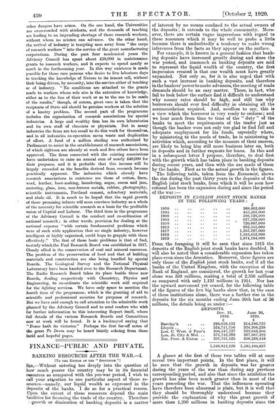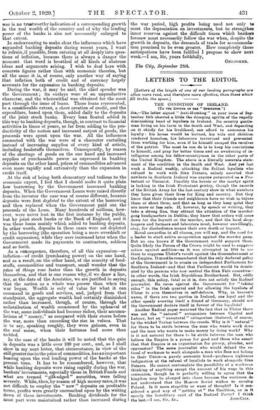FINANCE—PUBLIC AND PRIVATE.
BANKING RESOURCES AFTER THE WAR.—I.
(To THE EDITOR or THE " SPECTATOR."1 SE2,—Without entering too deeply into the question of how much poorer the country may be in its financial resources as compared with the pre-war period, I wish to call your attention to one particular aspect of those re- sources—namely, our liquid wealth as expressed in the deposits of the banks. I do so for a practical reason. Upon the extent of these resources depend the main facilities for financing the trade of the country. Therefore
growth or diminution of banking deposits is a matter of interest by no means confined to the actual owners of the deposits ; it extends to the whole community. More- over, there are certain vague impressions with regard to these resources which it may be well to probe a little because there is undoubtedly a tendency to make wrong inferences from the facts as they appear on the surface.
For example, it is known in a general fashion that bank- ing deposits have increased greatly during and since the war period, and inasmuch as banking deposits are said to represent the liquid wealth of the country, the first impression created is that our wealth must have greatly expanded. Not only so, for it is also urged that with such a vast increase in banking deposits, and therefore in the bankers' power to make advances, the meeting of trade demands should be an easy matter. Those, in fact, who fail to look below the surface find it difficult to understand why money rates should be high, and still less why borrowers should ever find difficulty in obtaining all the accommodation required. And, needless to say, this is a view which the borrower is very ready to endorse; and we hear much from time to time of the " duty " of the banks to meet the requirements of the trader just as though the banker were not only too glad to find full and adequate employment for his funds, especially where, by ministering to the needs of trade, he is nUnistering to activities which, according to the measure of their success, are likely to Ming him still more business later on, both in deposits and in further requests for loans. In this and in a subsequent letter I propose, therefore, to deal first with the growth which has taken place in banking deposits during recent years, and then with the use made of them by the banks. First as to the actual growth in the figures. The following table, taken from the Economist, shows the rise during the past thirty years in the deposits of the English joint stock banks, from which it will be seen how colossal has been the expansion during and since the period of the war :— DEPOSITS IN ENGLISH JOINT STOCK BANKS
IN THE FOLLOWING YEARS: 1890 • • 368,663,000 1895
1900 • •I 455,561,000
• • 586,726,000 1905 • • • 627,529,000 1910 720,687,000 191.5 992,555,000 1917 .. 1,365,297,000 1918 .. 1,583,412,000
From the foregoing it will be seen that since 1915 the deposits of the English joint stook banks have doubled. It will also be noted that a considerable expansion has taken place even since the Armistice. Moreover, these figures are only those of the English joint stock banks, and if all the banks of the United Kingdom, with the exception of the Bank of England, are considered, the growth for last year alone was 368 millions, making a total of 2,356 millions as compared with only 1,132 millions in 1914. Nor has the upward movement yet ceased, for the following table of the figures of the five big banks show that, in the case of these institutions alone, there was a further rise in the deposits for the six months ending June 30th last of 36 millions, the details being as under :—
DEPOSITS.
Dec. 31, June 30,
1919. 1920.
314,240,722 324,308,239 322,646,306 367,667,322 256,328,248 1,548,812,129 1,585,190,837
A glance at the first of these two tables will at once reveal two important points. In the first place, it will be seen that the growth in deposits was far greater during the years of the war than during any previous corresponding period, and also that since the armistice the growth has also been much greater than in most of the years preceding the war. That the influences operating have therefore been abnormal is plain, but it is well that they should be thoroughly understood because they provide the explanation of why this great growth of more than 1,200 millions in banking deposits since the Barclay's
Lloyds .. Lon. C. West. & Parr's Jt. City & Mid. .. Nat. Prov. & Union .. 296,059,132 324,711,756 304,547,727 371,742,389 251,751,125
war is no trustworthy indication of a corresponding growth in the real wealth of the country and of why the lending power of the banks is also not necessarily enlarged to that extent.
In endeavouring to make clear the influences which have expanded banking deposits during recent years, I want to refrain,if possible, from entering at all deeply into ques- tions of inflation, because there is always a danger the moment that word is breathed of all kinds of abstruse ideas and arguments arising. I wish to deal here with concrete figures rather than with economic theories, but all the same it is, of course, only another way of saying that inflation both of credit and of currency largely accounts for the expansion in banking deposits. During the war, it may be said, the chief spender was the Government ; its outlays were of an unproductive character, and the wherewithal was obtained for the most part through the issue of loans. Those loans represented, to a considerable extent, a sheer creation of credit, and the expenditure, based upon them, added daily to the deposits of the joint stock banks. Every loan floated added in this way to banking deposits, though, in contrast to financial activities in times of peace, so far from adding to the pro- ductivity of the nation and increased output of goods, the proceeds were spent upon the war. All the influences connected with the war were of a character curtailing instead of increasing supplies of every kind of article, including foodstuffs themselves. Consequently, by reason of the shortage of goods on the one hand and increased supplies of purchasable power as expressed in banking deposits on the other hand, prices of commodities advanced even more rapidly and extensively than the expansion in credit itself.
At the risk of being both elementary and tedious to the economic expert, I feel that I should make it quite plain how borrowing by the Government increased banking deposits. When the Government Loans were raised directly from the investor the case was of course different, because deposits were first depleted to the extent of the borrowing and then replaced when the Government paid out the proceeds of the Loan. Many hundreds of millions, how- ever, were never lent in the first instance by the public, but by joint stock banks or the Bank of England, and it was these loans mainly which added to banking deposits. In other words, deposits in these cases were not depleted by the borrowing (the operation being a mere overdraft or credit expansion), while they were increased later when the Government made its payments to contractors, soldiers and so forth.
As a consequence, therefore, of all this expansion—or inflation—of credit (purchasing power) on the one hand, and as a result, on the other hand, of the scarcity of food- stuffs, commodities and transport, small wonder that the price of things rose faster than the growth in deposits themselves, and that is one reason why, if we draw a line, say, at the date of the Armistice, we are justified in saying that the nation as a whole was poorer than when the war began. Wealth is only of value for what it can command in goods and services, and, judged from that standpoint, the aggregate wealth had certainly diminished rather than increased, though, of course, through the redistribution of wealth occasioned by the upheaval of the war, some individuals had become richer, their accumu- lations of " money," as compared with their stores before the war, more than exceeding the rise in values. That is to say, speaking roughly, they were gainers, even in the real sense, when their fortunes had more than trebled.
In the case of the banks it will be noted that the gain in deposits was a little over 100 per cent., and, as I shall show in my next letter, that circumstance, in view of the still greater riseinthe price of commodities, has animportant bearing upon the real lending power of the banks at the present time. It has to be remembered, however, that while banking deposits were rising rapidly during the war, bankers' investments, especially those in British Funds and what are termed "gilt-edged" securities, were falling severely. While, then, by reason of high money rates, it was not difficult to employ the " new " deposits on profitable terms, profits were greatly encroached upon by the writing down of these investments. Banking dividends for the most part were maintained rather than increased during the war period, high profits being used not only to meet the depreciation on investments, but to strengthen inner reserves against the difficult times which bankers foresaw must necessarily follow the war when, despite the growth in deposits, the demands of trade for accommoda- tion promised to be even greater. How completely those anticipations have been fulfilled I propose to show next week.—I am, Sir, yours faithfully, The City, September 28th. ONLOOKER.



































 Previous page
Previous page